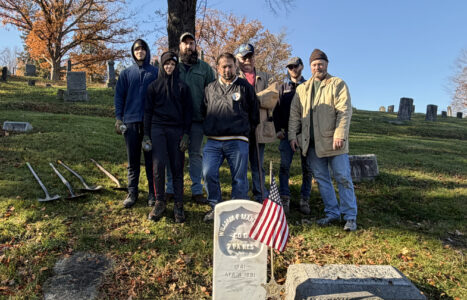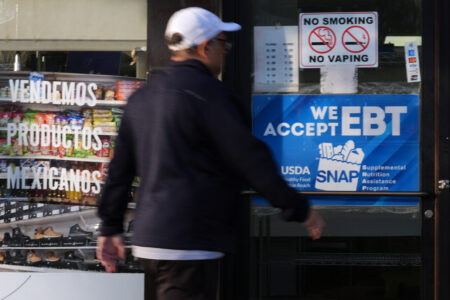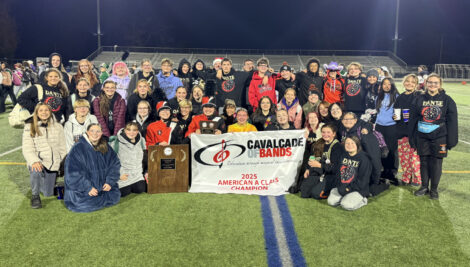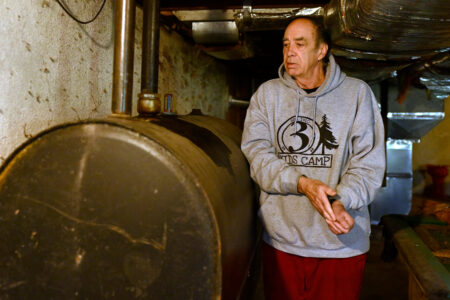Effort underway to revive canceled federal farm and food bank program in PA
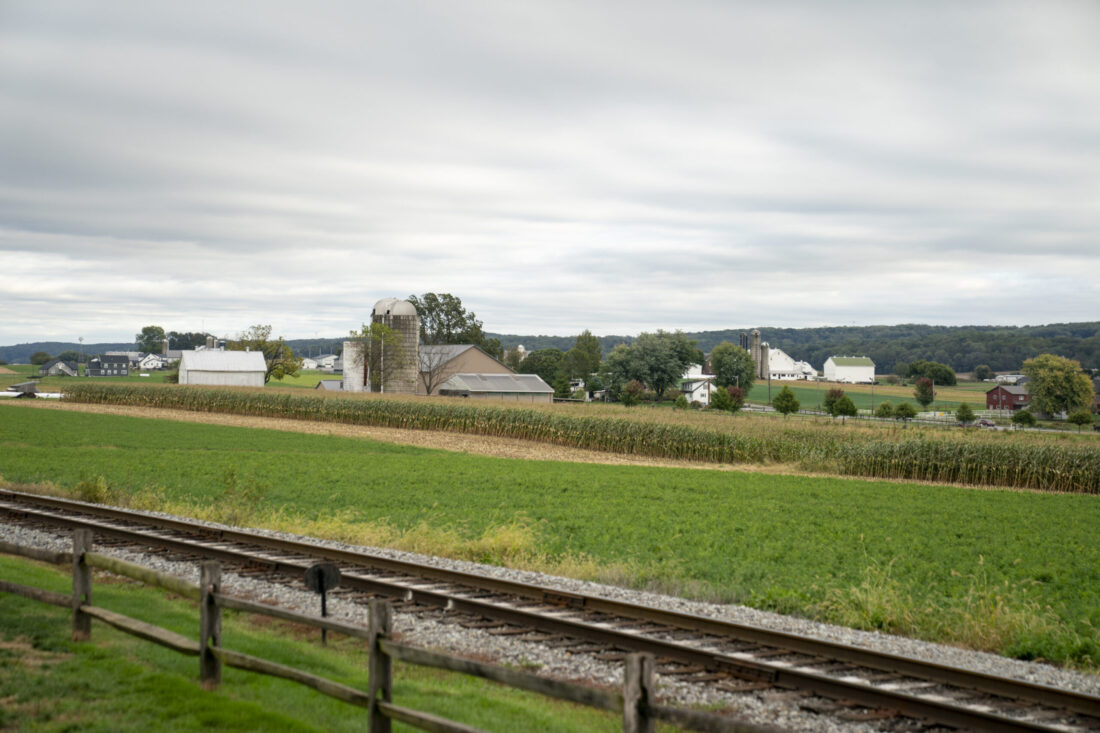
Photo by Jessica Kourkounis for the Pennsylvania Capital-Star The edge of a cornfield in Ronks, Lancaster County is pictured on Oct. 14.
Less than two months into President Donald Trump’s second term, the U.S. Department of Agriculture (USDA) announced that it was cancelling a program that sent millions of dollars to Pennsylvania farmers who provide products to food banks.
The Local Food Purchase Assistance Cooperative Agreement Program (LFPA) was established in 2021 as a response to the coronavirus pandemic by President Joe Biden’s administration.
In the final full month of Biden’s term, his administration agreed on the latest contract to renew the initiative. For Pennsylvania, it meant an additional three years and $13 million for the program.
The cancellation of LFPA in March resulted in bipartisan pushback from lawmakers like Gov. Josh Shapiro, all four chairs of the General Assembly’s agriculture committees (Republicans and Democrats), plus farmers and food banks, alike.
Since 2022, LFPA had provided nearly $30 million in funding to participating Pennsylvania farms to provide locally grown products to food banks, according to Shapiro’s office. Nearly 190 farms and 13 regional food banks across the state participated in this program.
Now, a bipartisan group of lawmakers, which includes U.S. Rep. Rob Bresnahan (R-8th District), have crafted legislation that could revive the intent of this program.
The Local Farmers Feeding Our Communities Act would allow states, through USDA, to establish these cooperative agreements connecting farmers and producers with food distribution organizations, according to the authors of the proposal. As a result, funds will be used to purchase local, fresh, and minimally processed foods like seafood, meat, milk, cheese, eggs, fruit, and poultry. The bill also sets aside a portion of these funds to purchase food specifically from small, midsize, beginning, and veteran farmers.
Bresnahan told the Capital-Star that there’s “certainly some correlations” between this proposal and the program established under the Biden administration.
In August, while attending his first Ag Progress Days at Penn State University as a member of Congress, Bresnahan said that agriculture is about a $65 million industry in his district, based in northeast Pennsylvania.
“The average farm in our district is 179 acres, with over 95% of them being family farms,” Bresnahan said.
“The idea is we talk about hunger. We talk about the food security challenges, but sometimes we’re not talking about the local farmers that produce this,” he added. “And this is a way that we can marry two of those different ideas together.”
Chris Hoffman, president of the Pennsylvania Farm Bureau, is backing the effort.
“I think that is just a miraculous program that we can take from the farms, go right into feeding our friends and neighbors who are in need,” Hoffman said. “It’s really, really serious when one of seven people go to bed hungry every night in Pennsylvania.”
“And so it’s our job,” he added. “We live in the land of plenty, and so we need to make sure we have food for everyone out there.”
In addition to the Farm Bureau’s support, the bill is also backed by several other organizations including Feeding Pennsylvania, the National Milk Producers, and Save the Children.
Democrats and Republicans talk about LFPA contract cancellation differently
The effort to revive the program has earned support from both sides of the aisle, although Democrats and Republicans differ on why it met its end.
Shapiro announced in June at the Share Food Program in Philadelphia that his administration filed a lawsuit against USDA over the cancellation.
“I’m tired of waiting for someone to stand up for our farmers and our food banks. That task falls to us,” Shapiro said. “The USDA and the Trump administration ignored our farmers, and they ignored folks who are hungry here in Pennsylvania.”
As of Oct. 30, there has not been a ruling.
U.S. Rep. Chellie Pingree (D-ME), one of the Democratic co-sponsors of the legislation, described the decision by the USDA to cancel the contract as an action that “pulled the rug out from under farmers and food banks.”
However, Republicans aren’t pointing the blame at Trump.
U.S. Rep. Glenn ‘GT’ Thompson (R-15th District) serves as the House Chair on the Committee on Agriculture.
During a roundtable discussion during Ag Progress Days, Thompson promoted Bresnahan’s proposal, but said the one established by the Biden administration was not authorized by Congress. He added it was “no surprise” that under an administration change, the program could be discontinued.
“I thought they were really good ideas,” Thompson said. “I begged Secretary Vilsack, who was President Biden’s secretary of agriculture, to work with Congress to bring us those proposals, to legislate them. And he refused.”
Bresnahan said the cancellation of the contract is what inspired the bipartisan action to find a solution for a program that he thought, “was very efficient.”
“Again, I’m not in the administration, and I’m not sure how the executive branch sometimes decides what programs come and what programs go, but we thought this was something if you were to really hone in on the actual program, the Local Farmers Feeding Our Communities Act was exactly that,” he told the Capital-Star.
In late August, Bresnahan led a roundtable discussion on the proposal in his district at Brace’s Orchard in Dallas, Luzerne County. He told the Capital-Star that 10% of the revenue, about 55,000 pounds of food at Brace’s Orchard last year, was through LFPA.
“What we want to do is codify this and make it a reality in perpetuity,” he said.
What do the Food Banks think?
George Matysik is the executive director of Share Food Program in Philadelphia, a hunger relief organization that serves the five county region in and around Philadelphia. Some 305,000 children across 800 schools are served daily through their work with the National School Lunch Program.
He said they participated in the LFPA program over the past few years as demand has increased.
Like others participating in the program, he found out in March when it was reported by national outlets like Politico.
“We had a signed deal for this. This was a contract that we had with the USDA,” he told the Capital-Star in an interview in September. “We had already put in orders with some of the local farmers.”
“So, it wasn’t just about the cancellation,” he added. “But it was also just about how we found out, when we found out, no notice with a signed contract, all of that made it all the more challenging for us.”
Matysik said the Share Food Program, at this time, has less resources than any time in recent memory, while they’ve seen a 120% increase over the last three years for those coming to them for food assistance.
“And now you’re taking away one of the one of the programs that really helps benefit the folks that we serve, in particular, again, with fresh, local, nutritious food, and you’re ripping that away at a time when we need these types of programs more than ever,” he said.
Five months after the cancellation of the contract, Matysik told the Capital-Star that they were feeling the impact of it.
“I have never seen our warehouse as depleted as it has been over the last three months, and that’s not just because of LFPA,” he said. “That’s also a number of the other cuts that we’ve received from this administration.”
“All of those cuts, all of those cancellations for us, has added up to about eight-and-a-half million dollars per year in total food and funding that our organization would receive that we’ve had pulled away from us,” he added. “So, more than a quarter of our total food and funding has been ripped away in the course of the last six months here.”
Matysik supports Bresnahan’s proposal and said if it was enacted, they would be able to serve about one-and-a-half million more meals per year over the three-year period.
However, adding that he was “thrilled” to see the proposal, Matysik said it only addresses “one very small portion of the total cuts” made over the course of the last year to food banks.
Where does it go from here?
Thompson has said he was going to work to include the measure in Farm Bill 2.0. However, he said they had to figure out a way to pay for it, so they don’t raise taxes and increase the debt, and pointed to Farm Bill 1.0 as an example.
“I think we’re going to get there,” Thompson said. “We’re both dedicated to getting that done.”
Bresnahan told the Capital-Star that if they can’t run it as an independent piece of legislation, they would hope to incorporate it into the next farm bill.
However, he didn’t express any concern about how to pay for it.
“I think a program like this could absolutely be paid for independently by just the proper administration of the program,” he added.
Bresnahan also expressed optimism his proposal could get across the finish line.
“I do think it has a reality, more so than ever,” he said to the Capital-Star, while noting the organizations that support it and the bipartisan support. “This is an example of how government can work together.”
A specific timeline on this piece of legislation being voted upon remains to be seen.
“But I’m guaranteeing this will be an important part of the Farm Bill 2.0 discussions,” Bresnahan told the Capital-Star.
——
Pennsylvania Capital-Star is part of States Newsroom, a network of news bureaus supported by grants and a coalition of donors as a 501c(3) public charity. Pennsylvania Capital-Star maintains editorial independence. Contact Editor Tim Lambert for questions: info@penncapital-star.com. Follow Pennsylvania Capital-Star on Facebook and Twitter.


